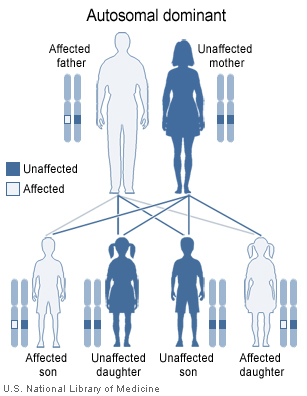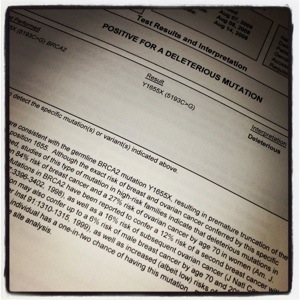You’ve probably heard about “the breast cancer gene” – the media loves to use that term. Or if you hadn’t before, I’m sure that changed on May 14, 2013 when the world exploded when Angelina Jolie wrote this powerful article about her decision to have a prophylactic mastectomy.
So what is this crazy gene, you ask? Well the nurse in me loves reputable sources like the National Cancer Institute, so I give you this, their excellent explanation of BRCA1/2 genes:
“BRCA1 and BRCA2 are human genes that produce tumor suppressor proteins. These proteins help repair damaged DNA and, therefore, play a role in ensuring the stability of the cell’s genetic material. When either of these genes is mutated, or altered, such that its protein product is not made or does not function correctly, DNA damage may not be repaired properly. As a result, cells are more likely to develop additional genetic alterations that can lead to cancer.
Specific inherited mutations in BRCA1 and BRCA2 increase the risk of female breast and ovarian cancers, and they have been associated with increased risks of several additional types of cancer. Together, BRCA1 and BRCA2 mutations account for about 20 to 25 percent of hereditary breast cancers (1) and about 5 to 10 percent of all breast cancers (2). In addition, mutations in BRCA1 and BRCA2 account for around 15 percent of ovarian cancers overall (3). Breast cancers associated with BRCA1 and BRCA2 mutations tend to develop at younger ages than sporadic breast cancers.
A harmful BRCA1 or BRCA2 mutation can be inherited from a person’s mother or father. Each child of a parent who carries a mutation in one of these genes has a 50 percent chance of inheriting the mutation. The effects of mutations in BRCA1 and BRCA2 are seen even when a person’s second copy of the gene is normal.”
Which gene mutation do you have?
I have a deleterious mutation of BRCA2. These are my test results:
When did you find out?
My “BRCA-versary” is August 14, 2008. I was 20 years old when I found out.
Who did you get it from?
Unlike many families who have a ridiculously strong family history of breast and/or ovarian cancers, we have a pretty small family that we have known history about, so it wasn’t that obvious that there was something going on. My Aunt was first diagnosed with breast cancer in 1997, but it wasn’t until 2008 (and more than one relapse) that she was tested. When she came back positive, my Dad was tested. When he was positive, I was tested.
To show that in an image… Dad is positive, I am the “affected daughter” on the far right:

What does it mean – what is your risk?
I’m a visual person, so I prefer graphs like this:

The numbers speak for themselves… and they’re not pretty.
Why were you tested so young?
When to test is a huge debate, and even more so, a personal decision. The national guidelines recommend screening to begin at age 25 for BRCA carriers, so I know some people wonder why I was tested before I would have to do anything about it. But I was tested when I first learned about it, because it was important to me to know, and it would have been more stressful for me, personally, to worry about the unknown. I fully believe that I can handle anything, as long as I know what it is. But I also know that not everyone is like that, which is why it’s such a personal decision to be tested, and why no one should be pressured into it. I think it’s important to also consider what you will do with the results, either way. And I can’t stress the importance of utilizing a genetic counselor. This is what they are trained to do, and they do it so well.
Interestingly, even with those guidelines, women younger than me are having risk-reducing surgeries. The youngest I’ve heard about is 18 (which would be the absolute youngest, as you have to be able to consent to the test and surgery), and the youngest my surgeons have operated on is 21. I commend those women for sure, and honestly can’t say what I would have done if surgery had been offered when I found out I was positive. But I’ve said it before and I’ll say it again – having the surgery at 25, the timing for me, for my surgery was perfect. And I wouldn’t have changed a thing.
Is anyone else in your family positive?
At this point, we know that my cousin (the only other female that could be affected) is negative (remember it’s a 50/50 chance). The other guys (brother and cousin) may be tested in the future, but increased surveillance for them wouldn’t start until 40 anyhow, so there’s no rush.
Where can I find out more information about the test?
For many years, Myriad was the only company that offered the testing, and is the company that performed mine. I think they do a great job explaining it here.
